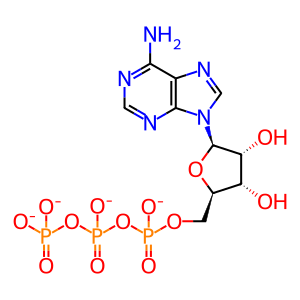Reaction: TGFBR2 KD mutants do not phosphorylate TGFBR1
- in pathway: TGFBR2 Kinase Domain Mutants in Cancer
Phosphorylation of TGFBR1 by TGFBR2 kinase domain (KD) mutants has not been directly experimentally examined. Residues targeted by missense mutations that were shown to impair TGF-beta (TGFB1)-mediated signaling - arginine R528, aspartic acid D522, glutamic acid E526, tyrosine Y470 (Grady et al. 1999, Tanaka et al. 2000) - are conserved between human, mouse, rat, chicken, zebrafish and Xenopus TGFBR2. These residues, especially R528, are also conserved or partially conserved in other serine/threonine kinases (Lin et al. 1992), which is indicative of their importance for the catalytic activity of TGFBR2. Therefore, TGFBR2 KD mutants TGFBR2 R528H, TGFBR2 R528H, TGFBR2 D522N, TGFBR2 Y470D and TGFBR2 E526Q are likely catalytically inactive and unable to phosphorylate and activate TGFBR1.
Presentation of TGFBR2 kinase domain (KD) mutants on the cell surface and their interaction with TGF-beta (TGFB1) and subsequently TGFBR1 has not been directly experimentally examined. However, as mutations affecting the kinase domain in TGFBR2 are missense mutations of conserved residues in the kinase domain, while the rest of the TGFBR2 sequence is intact (Grady et al. 1999, Tanaka et al. 2000), TGFBR2 KD mutants are expected to behave similarly to the wild-type TGFBR2 with respect to cell surface expression, ligand binding, and TGFBR1 interaction.
Presentation of TGFBR2 kinase domain (KD) mutants on the cell surface and their interaction with TGF-beta (TGFB1) and subsequently TGFBR1 has not been directly experimentally examined. However, as mutations affecting the kinase domain in TGFBR2 are missense mutations of conserved residues in the kinase domain, while the rest of the TGFBR2 sequence is intact (Grady et al. 1999, Tanaka et al. 2000), TGFBR2 KD mutants are expected to behave similarly to the wild-type TGFBR2 with respect to cell surface expression, ligand binding, and TGFBR1 interaction.
Reaction - small molecule participants:
ATP [cytosol]
Reactome.org reaction link: R-HSA-3645780
======
Reaction input - small molecules:
ATP(4-)
Reaction output - small molecules:
Reactome.org link: R-HSA-3645780

